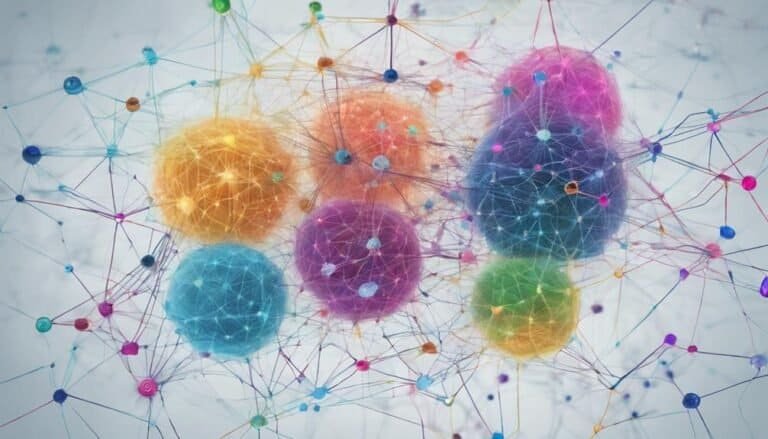AI in Drug Discovery: Accelerating Pharmaceutical Innovations
In the realm of pharmaceutical research, the integration of artificial intelligence (AI) has revolutionized the landscape of drug discovery by expediting the identification of potential compounds and enhancing predictive models for efficacy.
The utilization of AI algorithms has significantly streamlined the traditionally time-consuming drug development processes, offering promising avenues for accelerated innovation. This synergy between AI and pharmaceuticals has not only optimized existing treatments but also holds the potential to unveil groundbreaking therapies that could redefine the future of medicine.
The convergence of AI and drug discovery presents a compelling narrative of how technology is reshaping the boundaries of pharmaceutical advancements.
Key Takeaways
- AI optimizes drug screening, enhancing prediction accuracy.
- Virtual screening automates candidate identification, expediting the process.
- AI predicts efficacy and safety, improving drug discovery efficiency.
- Data integration streamlines development, accelerating pharmaceutical innovations.
Evolution of Drug Discovery With AI
In recent years, the integration of artificial intelligence (AI) has significantly transformed the landscape of drug discovery, revolutionizing traditional methodologies and accelerating the process of identifying novel therapeutic candidates. AI algorithms have been instrumental in streamlining drug screening processes by quickly analyzing vast amounts of data to identify potential compounds with therapeutic value. Machine learning, a subset of AI, plays a crucial role in predicting the efficacy and safety of these compounds by recognizing patterns in biological and chemical data.
Moreover, AI has enabled researchers to identify genetic targets more efficiently, allowing for a more targeted approach in drug discovery. By analyzing complex biological systems and genetic data, AI can pinpoint specific genes or proteins that play key roles in diseases, thereby guiding scientists towards developing drugs that interact with these targets. This targeted approach not only speeds up the drug discovery process but also increases the likelihood of success in developing effective treatments for various conditions.
AI-Powered Drug Candidate Identification
Utilizing advanced algorithms and computational models, artificial intelligence (AI) has revolutionized the process of identifying potential drug candidates by swiftly analyzing complex biological and chemical data. Machine learning plays a crucial role in this process, enabling AI to learn from data patterns and make predictions on potential drug candidates with high accuracy.
One key application of AI in drug candidate identification is virtual screening, where AI algorithms screen large databases of chemical compounds to identify those with the highest potential to interact with a specific biological target. By automating this screening process, AI significantly accelerates the identification of promising drug candidates, saving time and resources in the drug discovery pipeline.
The use of AI in drug candidate identification not only expedites the process but also enhances the likelihood of discovering novel and effective treatments for various diseases. This integration of AI and machine learning in virtual screening represents a significant advancement in pharmaceutical innovation, paving the way for more efficient drug discovery processes.
Enhancing Efficacy Prediction With AI
How can artificial intelligence (AI) further enhance the prediction of drug efficacy in the field of drug discovery? AI has the potential to revolutionize efficacy prediction by improving modeling techniques and leveraging predictive analytics. Here are key ways AI can enhance efficacy prediction:
- Enhanced Data Analysis: AI algorithms can sift through vast amounts of biological data to identify patterns and correlations that traditional methods might miss.
- Personalized Medicine: AI can help predict how individual patients will respond to specific drugs based on their genetic makeup and other personal factors.
- Accelerated Screening: By streamlining the screening process, AI can quickly assess the efficacy of a wide range of drug candidates, saving time and resources.
- Improved Target Identification: AI algorithms can prioritize potential drug targets by analyzing biological pathways and predicting their impact on efficacy.
- Optimized Clinical Trials: AI can optimize clinical trial designs by predicting patient responses and identifying potential risks early on, leading to more efficient trials and faster drug development timelines.
Streamlining Drug Development Processes
To expedite drug development, optimizing processes within the pharmaceutical industry is paramount. One key aspect of streamlining drug development processes is the effective integration of data from various sources. Data integration involves consolidating information from different research studies, clinical trials, and databases to provide a comprehensive view of the drug development landscape. By centralizing and harmonizing data, researchers can make more informed decisions throughout the drug development lifecycle.
Another crucial element in streamlining drug development processes is process optimization. This involves identifying inefficiencies, redundancies, or bottlenecks in the drug development workflow and implementing strategies to improve overall efficiency and productivity. Utilizing technologies like artificial intelligence can help automate repetitive tasks, analyze large datasets quickly, and predict outcomes more accurately, thereby speeding up the drug development timeline.
Impact of AI on Novel Treatments
Artificial intelligence (AI) is revolutionizing the landscape of drug discovery by enhancing the identification and development of novel treatments. AI's impact on novel treatments is profound, leading to the emergence of personalized medicine and precision therapy.
Here are some key ways AI is influencing the development of novel treatments:
- Enhanced Target Identification: AI algorithms analyze complex biological data to identify potential drug targets more efficiently.
- Accelerated Drug Design: AI expedites the drug design process by predicting molecular interactions and optimizing drug candidates.
- Improved Clinical Trial Design: AI analyzes patient data to design more effective and personalized clinical trials for novel treatments.
- Optimized Treatment Regimens: AI helps tailor treatment regimens based on individual patient characteristics for better outcomes.
- Predictive Patient Outcomes: AI enables the prediction of patient responses to novel treatments, facilitating precision therapy approaches.
The integration of AI in drug discovery holds tremendous promise for advancing the development of novel treatments, ultimately leading to more effective and personalized healthcare solutions.
Conclusion
In conclusion, the integration of AI in drug discovery has revolutionized the pharmaceutical industry. It expedites the identification of drug candidates, enhances efficacy prediction, and streamlines development processes.
The impact of AI on novel treatments is akin to a beacon of light guiding researchers through the complex maze of drug discovery. It opens up new possibilities and accelerates pharmaceutical innovations.







